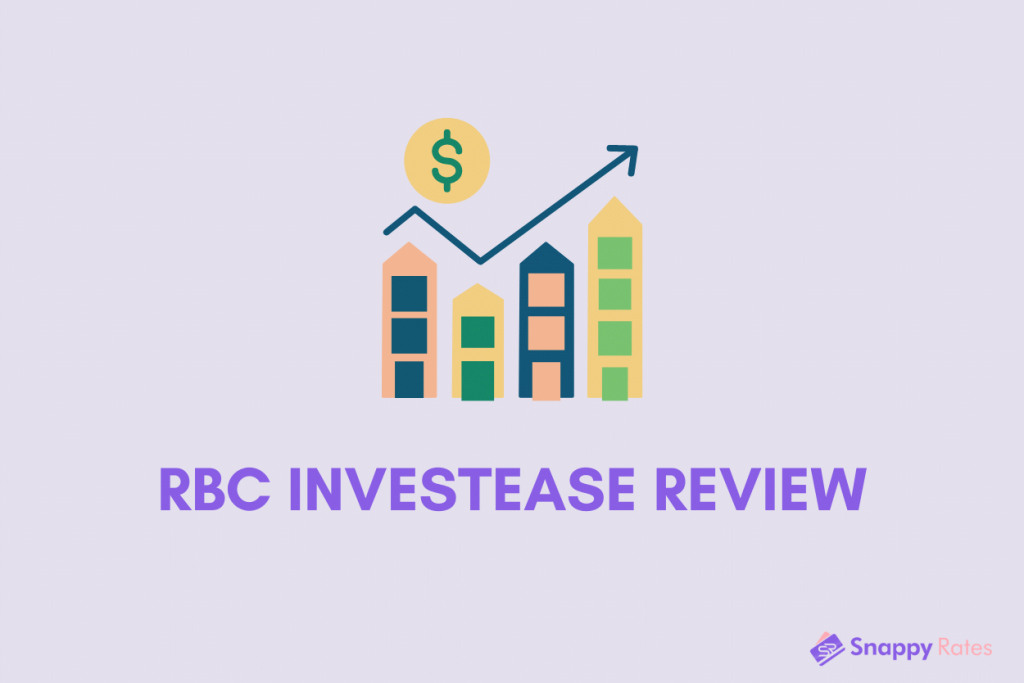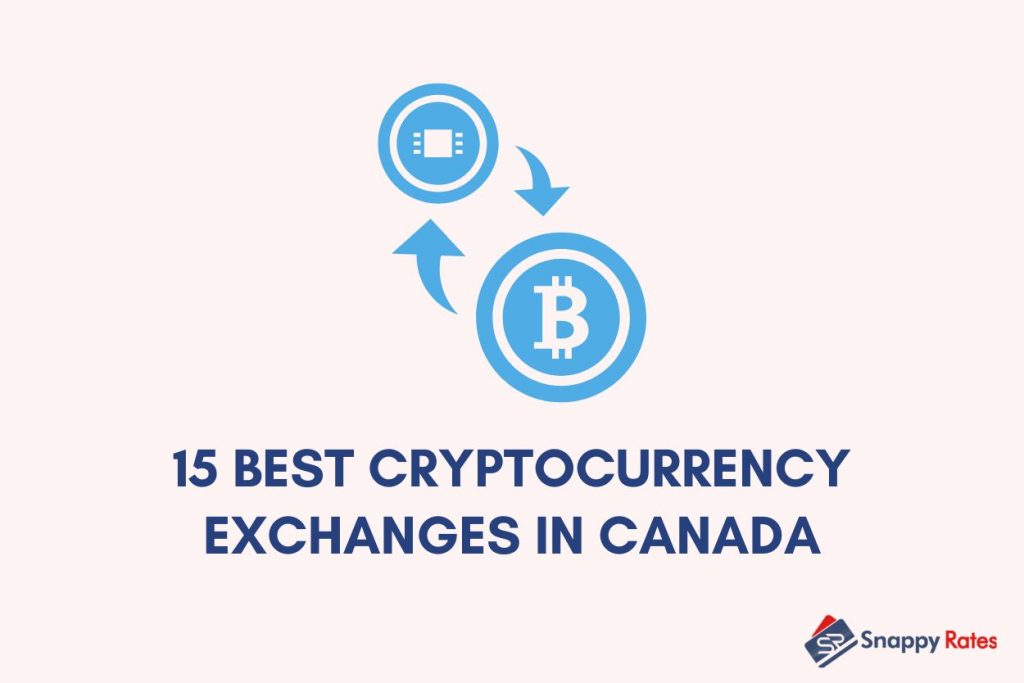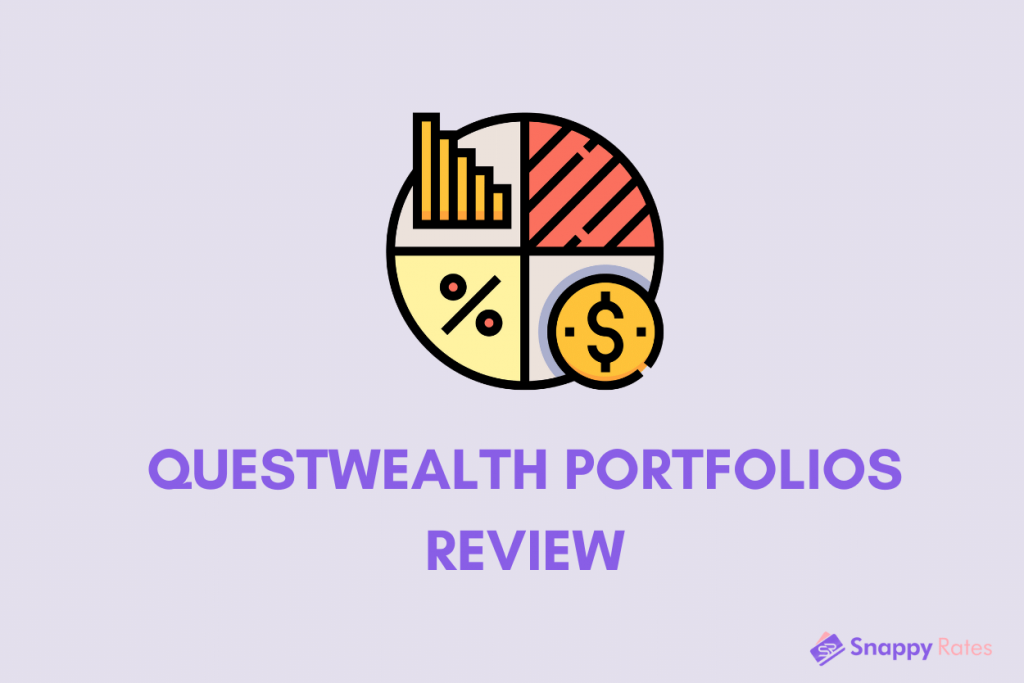Free stock trading apps are great for beginners looking to get their feet wet with investing.
While saving on trading fee commissions, you can buy and sell small amounts of stocks or Exchange-Traded Funds (ETFs) and get familiar with order types, ticker symbols, stock prices, market data charting tools, and more.
Many of the popular online brokerage platforms in Canada can be expensive if you invest small amounts of money, as the fees they charge cut into your capital.
In this article, I cover the best free stock trading apps for Canadians, including Wealthsimple Trade.
Summary: The best free stock trading app in Canada is Wealthsimple Trade, as it does not charge trading commissions when you buy and sell stocks. For free ETF trading, you can use Questrade, Virtual Brokers, Qtrade, and National Bank Direct Brokerage.
Best Free Stock Trading Apps 2024
| Platform | Stock Commission | ETF Commission | Inactivity Fee | Account Minimum |
| Wealthsimple Trade | $0 | $0 | None | None |
| Questrade | $4.95 – $9.95 | $0 purchases; $4.95 – $9.95 sell orders | None | $1,000 |
| Virtual Brokers | $1.99 – $7.99 | $0 purchases; $1.99 – $9.95 for sales | $24.95/quarter | None |
| Qtrade | $6.95 – $8.75 | $0 for 100 ETFs (minimum $1k purchase applies) | $25/quarter | None |
| NBDB | $0 | $0 | $100/year | None |
Free Trading Apps in Canada
1. Wealthsimple Trade
Wealthsimple Trade is the only stock trading app in Canada that offers commission-free trades for stocks and ETFs.
This platform has no minimum account balance and is great for beginner investors who plan on investing any amount they have available.
The Wealthsimple Trade app has a clean interface that simplifies the trading process.
When your account has been set up, you can search for your preferred stocks (on both Canadian and U.S. exchanges) and place trades with a few clicks.
You can also trade on your laptop using the web interface.
The platform supports personal non-registered investment accounts and registered ones like TFSAs and RRSPs.
Pros:
- Offers commission-free stock trading
- Owned by a reputable company, Wealthsimple
- Regulated platform and eligible for CIPF protection
- No account inactivity fees
- Reimburses transfer fees when you move accounts with a $5,000+ balance (up to $150 waived)
- Accessible on multiple devices
- $25 bonus when you sign up and deposit $150
Cons:
- Supports only stocks and ETFs
- Price data has a 15-minute delay unless you subscribe to Wealthsimple Trade Premium

2. Questrade
Questrade is quite popular and gets more than 200,000 new customers every year. This platform was launched in 1999 and is available on smartphones and desktop devices.
It supports several investment products, including stocks, ETFs, options, foreign exchange, precious metals, GICs, bonds, mutual funds, and new issues.
Unlike Wealthsimple Trade, you pay commissions when you buy or sell stocks on Questrade, although the fees are very competitive when compared to brokerages at the big banks.
To begin trading on Questrade, you must deposit at least $1,000.
Trading fees for stocks start at 1 cent per share, with a minimum commission of $4.95 and a maximum of $9.95 per trade.
Questrade is one of a few platforms with commission-free ETF purchases, which means you can buy any stock, bond, or commodity ETF and not pay trading fees until you sell it.
Questrade supports registered, non-registered, and corporate investment accounts.
Pros:
- Versatile trading platform with access to most investment products
- Competitive trading commissions
- Supports advanced trading strategies and tools
- Commission-free ETFs
- No inactivity fees
- Reimburses transfer fees up to $150
- Regulated platform and eligible for CIPF insurance
- Multiple investment accounts are supported
- $50 free trade credit with $1000 deposit
Cons:
- Only ETF purchases are free; you pay to buy and sell stocks
- Minimum $1,000 balance to start trading

3. Virtual Brokers
Virtual Brokers is a division of CI Investment Services. It was founded in 2009 and is considered one of the best self-directed trading platforms in Canada.
Virtual Brokers offers free ETF purchases, and you can buy and sell stocks starting at 1 cent per share (minimum of $1.99 and maximum of $7.99 per trade).
The platform can be accessed using their iOS or Android app and via a web interface.
Investment products supported include stocks, mutual funds, options, ETFs, and bonds.
Like Questrade, Virtual Brokers supports TFSA, RRSP, RESP, RRIF, LRSP, and RLIF accounts.
Pros:
- Offers commission-free ETFs
- Stock trading fees are competitive
- Regulated trading platform with CIPF protection
- Advanced trading tools are available for a fee
Cons:
- $24.95 quarterly account administration fee if total assets are less than $5,000
- USD registered accounts have a $15 USD quarterly fee
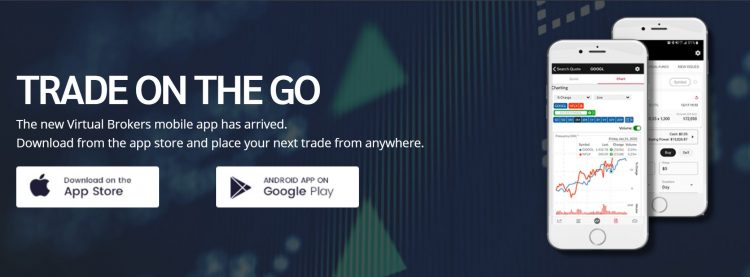
4. Qtrade Investor
Qtrade Direct Investing is owned by Aviso Wealth, a wealth management company with over $90 billion in assets.
It offers 100 commission-free ETFs, and you don’t pay trading commissions when you buy or sell these ETFs.
A downside to this offer is that you must place an order value that is worth at least $1,000 to take advantage of the free ETFs.
As for stocks, you pay $6.95 to $8.75 per trade, depending on whether you are an active trader or only place trades once in a while.
Investment products offered on Qtrade include stocks, mutual funds, ETFs, bonds, options, and exchange-traded debentures.
The platform also offers a 30-day trial account.
Pros:
- 100 commission-free ETFs
- Regulated platform with CIPF protection
- Reimburses transfer fees up to $150 if assets are $15,000 or more
- Access to advanced charting tools and real-time quotes
Cons:
- $25 quarterly administration fee if your account is lower than $25,000
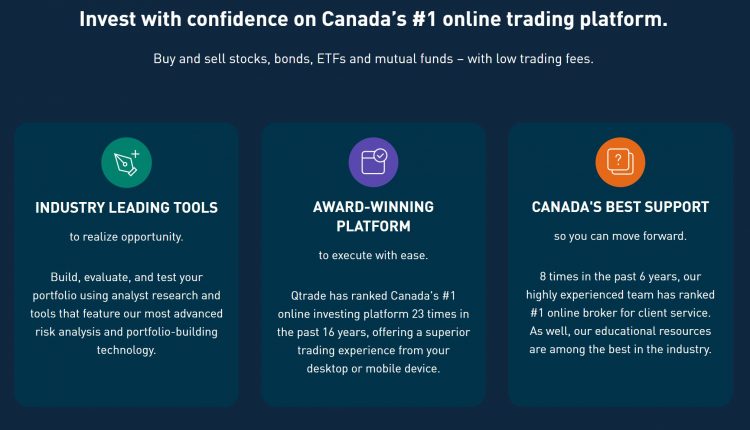
5. National Bank Direct Brokerage
National Bank Direct Brokerage (NBDB) is one of a few brokerage platforms owned by a big bank to offer $0 commission ETFs and stocks.
The platform supports registered and non-registered accounts, and you can invest with ETFs, stocks, options, bonds, GICs, and linked notes.
Pros:
- Supports multiple account types and investment products
- Has no minimum deposit
- Commission-free ETFs
- Regulated platform with CIPF protection
Cons:
- Trading commissions apply to options trades
- $100 account administration fee if total asset is less than $20,000
- No mobile trading app
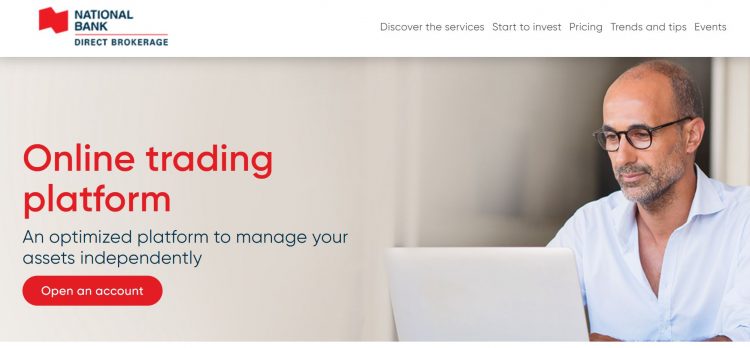
Stock Trading in Canada
Stock trading involves buying and selling shares in a company with the aim of making a profit.
When you own shares (or stocks) in a company, you become a part-owner (i.e., shareholder) and are eligible to share in its profits through dividends.
You can hold a stock long-term with the hope that its price will continue to rise and it will continue to pay you dividends.
You can also speculate on its short-term price performance and cash in your gains within minutes, hours, or days.
Investors who buy and sell stocks within a noticeably short timeframe are called day traders.
How To Trade Stocks
Stocks of companies are listed and traded on a stock exchange.
For example, in Canada, the most popular exchange is the Toronto Stock Exchange (TSX). In the United States, there is the New York Stock Exchange (NYSE) and NASDAQ.
To buy a stock, you need to open an online brokerage account.
This investment account provides access to the stock exchange so you can easily buy and sell stocks from the comfort of your home.
In fact, you can trade from anywhere in the world using a stock trading app on your phone.
Online brokerage platforms are also known as “discount brokerages” to highlight their low or no-fee commissions compared to traditional brokerage firms.
Buying and selling stocks on your own is easy but takes some time. If you are uncomfortable being in the driver’s seat, an alternative way to invest in stocks is through a robo-advisor.
Robo-advisors are online wealth management companies that help you invest in stocks and other investment assets using Exchange-Traded Funds (ETFs).
In exchange for a management fee, robo-advisors automatically invest your money, reallocate assets when necessary (i.e. rebalancing), minimize your investment taxes through tax-loss harvesting, and provide limited financial advice.
How Commission-Free Trading Works
Financial institutions exist to make money, so it should not surprise you that a trading commission is charged every time you buy or sell a stock.
The trading fee varies across trading platforms and can be as high as $9.99 per trade for stocks.
That said, commission-free trading platforms exist in Canada.
One platform (Wealthsimple Trade) waives trading commissions when you buy and sell stocks or ETFs. Others waive trading fees when you purchase ETFs and charge fees when you sell.
Trading commissions are not the only fees you pay to an online broker.
If you place orders for U.S.-listed stocks using Canadian dollars, a foreign currency conversion fee may apply.
There are also a bunch of administrative fees, such as account transfer fees, telephone order fees, inactivity fees, market data fees, statement fees, and more.
How To Open a Stock Trading Account in Canada
Before choosing an online broker, look at the following:
Fees: How much will you be paying in commissions and fees? If you plan to start small, see if the brokerage has an inactivity fee (also called account administration or maintenance fee) that is paid when your balance is under a specific limit.
Accounts Offered: Depending on the type of account you plan to open, your choice of a broker might be limited.
Popular registered accounts are:
- Registered Retirement Savings Plan (RRSP)
- Tax-Free Savings Account (TFSA)
- Registered Retirement Income Fund (RRIF)
- Registered Education Savings Plan (RESP)
- Locked-in Retirement Account (LIRA)
- Life Income Fund (LIF)
For non-registered accounts, you can open personal, business, margin, trust, or investment club accounts.
Investment Products: Confirm that the online brokerage supports the investment asset you plan to trade. Asset classes include stocks, ETFs, bonds, options, FOREX, GICs, precious metals, and mutual funds.
Trading Platform: It helps if the trading platform is accessible on different types of devices. A good mobile app makes it easy to track your portfolio and place trades while on the go.
Beginners may prefer a clutter-free interface that does not overwhelm them with options. Whereas experienced traders may desire desktop applications, they can use for advanced options strategies, etc.
Trading Tools: In addition to market data, you may want access to market news, research, watchlists, stock screeners, and technical analytical tools.
Account Minimums: A brokerage may require you to deposit a minimum amount before you can start trading. Some have no minimum requirements, and you can invest with as little as $1.
Conclusion
After deciding on the trading platform, you can open your account online.
You will need to verify your identity by providing your Social Insurance Number and uploading a copy of your government-issued ID. A void cheque may also be needed and is used to link your bank account to make funding easier.
After your account is approved and funded, you can begin trading.
Related: Neo Financial Review.

